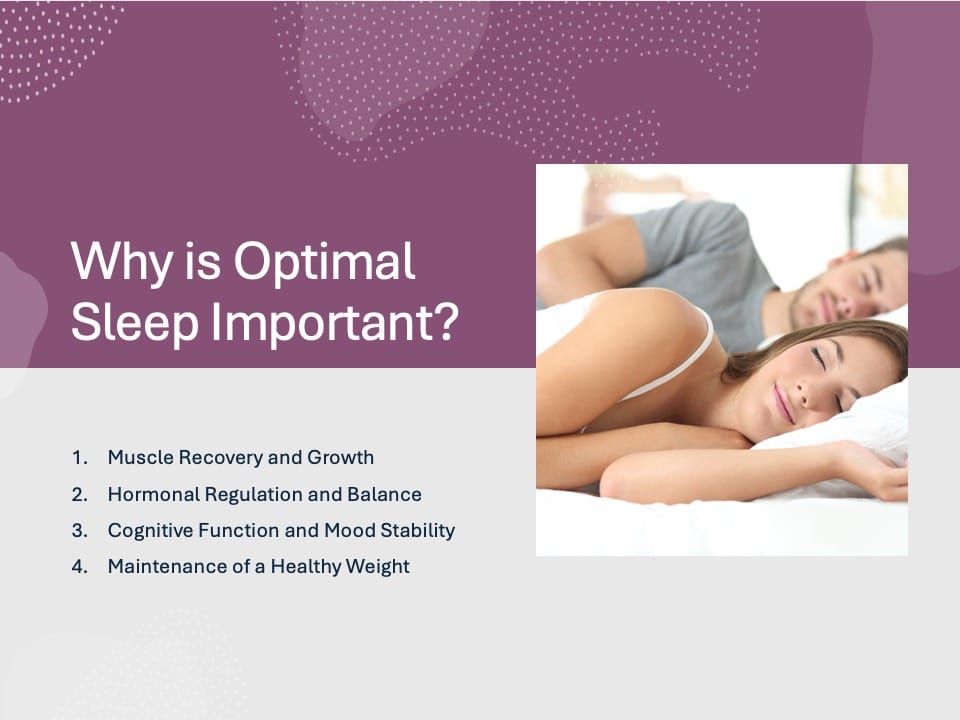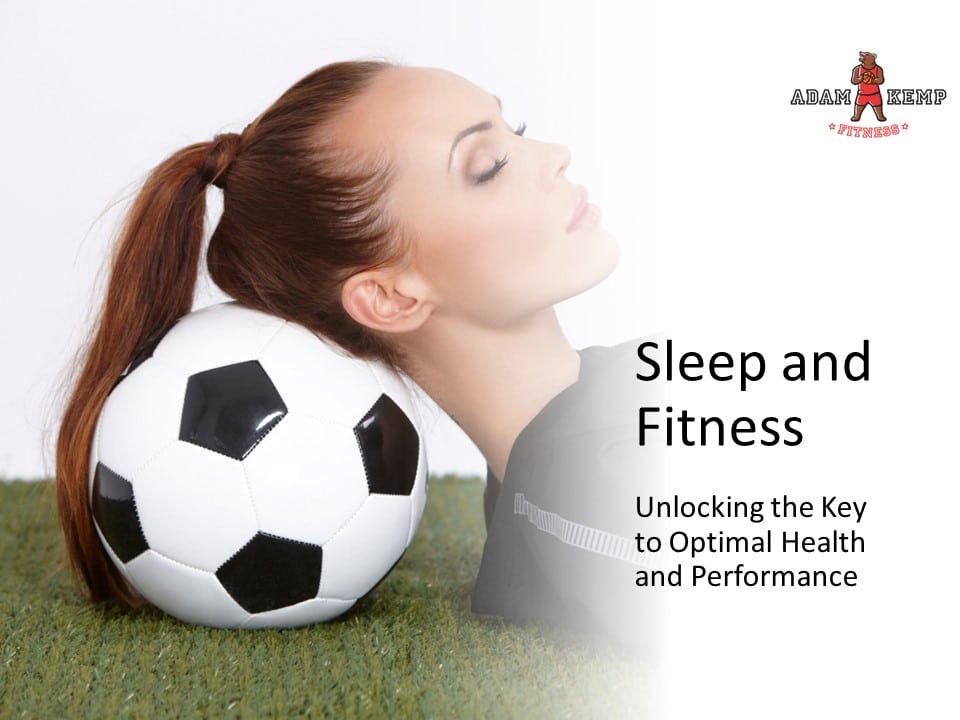Sleep and Fitness: How Does Sleep Affect Your Fitness Level?
Sleep is essential for health, fitness, and athletic performance, yet it’s often undervalued in our busy lives.
Did you know that over one-third of adults don’t get the recommended 7-9 hours of sleep per night?
This lack of sleep disrupts weight management, muscle growth, and recovery, making fitness goals harder to achieve.
Sleep is crucial for muscle repair, cognitive function, and hormonal balance.
Without sufficient sleep, our bodies struggle to recover from exercise fatigue, leading to decreased performance and an increased risk of injury.
Additionally, sleep plays a significant role in regulating hormones that control hunger and stress, further impacting overall health and fitness.
Prioritizing quality sleep can optimize physical performance and overall well-being.
Strategies like maintaining a consistent sleep schedule, creating a relaxing bedtime routine, and optimizing your sleep environment can significantly enhance sleep quality.
Read the full article now to discover how sleep can transform your fitness and overall health!
Importance of Sleep in Health and Fitness

Adequate sleep is vital for many aspects of our lives, including general health, fitness, and athletic performance.
Sleep affects nearly every system in our bodies, from the immune system to the central nervous system.
Optimal sleep is essential for:
- Muscle recovery and growth
- Hormonal regulation and balance
- Cognitive function and mood stability
- Maintenance of a healthy weight and metabolism
Let’s take a deeper look at the impact of sleep on health and fitness:
Sleep and Weight Management
Sleep plays a significant role in weight loss and weight gain because inadequate sleep can profoundly impact your body’s ability to manage weight effectively.
- Disruption of Appetite-Regulating Hormones: Poor sleep increases ghrelin (the hunger hormone) and decreases leptin (the satiety hormone), leading to increased hunger and overeating.
- Decreased Insulin Sensitivity: Chronic sleep deprivation can contribute to insulin resistance, increasing the risk of developing type 2 diabetes and making weight management more challenging.
- Impact on Metabolism: Sleep deprivation lowers your basal metabolic rate (BMR), making losing or maintaining a healthy weight more difficult. It also raises cortisol levels, which can lead to abdominal weight gain.
- Reduced Motivation and Energy Levels: Inadequate sleep lowers motivation and energy levels, making engaging in regular exercise more difficult.
Sleep and Muscle Growth
Optimal sleep is critical for muscle growth and recovery.
During sleep, your body undergoes several processes that contribute to muscle development and repair:
- Release of Growth Hormone: During deep sleep, your body releases human growth hormone, essential for muscle repair and growth.
- Protein Synthesis: Sleep provides the necessary conditions for protein synthesis, rebuilding and strengthening muscle tissue.
- Increased Blood Flow to Muscles: Enhanced blood flow during sleep delivers vital nutrients and oxygen necessary for recovery.
- Nervous System Recuperation: Adequate sleep allows your nervous system to recover and regenerate, leading to improved performance and reduced risk of injury.
Sleep and Immune System
Sleep is vital for maintaining a strong immune system.
During sleep, the body produces cytokines, activates immune cells, and regulates inflammation, all contributing to a healthy immune response.
Sleep deprivation can weaken the immune system, leading to increased susceptibility to illness and slower recovery from illness or injury.
Sleep and Stress Management
A strong connection exists between sleep and stress management.
Poor sleep can contribute to increased stress levels, while high stress-levels can impair sleep quality.
Establishing healthy sleep habits and managing stress through relaxation techniques, physical activity, and social support can enhance overall well-being and fitness.
How Much Sleep Do I Need?
Generally, adults require 7-9 hours of sleep per night, while athletes may need closer to 8-10 hours for optimal recovery and performance.
Can Napping Substitute for Lack of Nighttime Sleep?
While naps can provide a temporary energy boost, they should not be considered a substitute for a full night’s sleep.
Taking a nap can be beneficial when used strategically, such as a 20-30 minute power nap for a quick energy boost or a 90-minute nap to complete a full sleep cycle.
How to Determine If You Are Getting Enough Sleep
To determine if you are getting enough sleep, it is essential to recognize the signs of sleep deprivation and monitor recovery metrics such as heart rate variability (HRV).
Signs of Adequate Sleep
Some common indicators that you are getting enough sleep include:
- Waking up feeling refreshed and energized
- Maintaining consistent energy levels throughout the day
- Experiencing minimal daytime sleepiness
- Falling asleep within 15-20 minutes of going to bed
- Remaining alert and focused during daily tasks and activities
On the other hand, common signs of sleep deprivation include persistent fatigue, difficulty concentrating, irritability, reduced motivation, frequent illness, and a decline in athletic performance.
Signs You are Not Sleeping Enough
Some signs of inadequate sleep include:
- Persistent fatigue or tiredness throughout the day
- Difficulty concentrating or focusing on tasks
- Irritability and mood swings
- Reduced motivation or productivity
- Frequent illness or weakened immune response
- A decline in athletic or exercise performance
- Increased daytime sleepiness or unintended napping
- Trouble falling asleep or staying asleep at night
- Memory problems or forgetfulness
- Impaired decision-making and problem-solving abilities
Heart Rate Variability (HRV)
HRV is a valuable metric for assessing recovery status, stress levels, and the risk of overtraining.
Monitoring HRV can help athletes identify periods of increased stress and potential overtraining, allowing them to adjust their training and recovery strategies accordingly.
Many fitness trackers offer HRV tracking features that can be used to monitor recovery and avoid overtraining.
Natural Ways to Fall Asleep Faster and Sleep Better
Improving sleep quality can significantly impact overall health and fitness.
Incorporating these natural strategies into your daily routine can help you get better sleep and contribute to better overall health, fitness, and well-being.
Establish a Consistent Sleep Schedule: Going to bed and waking up at the same time each day helps regulate the body’s internal clock, making it easier to fall asleep and wake up feeling refreshed.
Optimize Your Sleep Environment: Ensure your bedroom is dark, quiet, and cool. Use blackout curtains or a sleep mask, a white noise machine or earplugs, and keep the room temperature between 60-67°F (15-19°C). Invest in a comfortable mattress, pillows, and bedding that suit your needs.
Limit Exposure to Screens and Blue Light: Reduce screen time at least an hour before bedtime and consider using blue light-blocking glasses in the evening.
Be Mindful of Diet and Caffeine Intake: Avoid heavy meals, spicy or fatty foods, and excessive liquid intake close to bedtime. Limit caffeine consumption and be cautious of alcohol consumption. Alcohol negatively impacts sleep, even though it might make you feel drowsy initially.
Use Supplements for Sleep: Natural sleep aid supplements like ashwagandha, zinc, magnesium, and tart cherry can enhance sleep quality. If you’d like to try a sleep supplement, Rootcha’s Zinc + Magnesium Complex is a good option I recommend to people for help with improving their sleep quality.
Last update on 2025-07-15 / This article includes affiliate links/Images via Amazon Product Advertising API. I may earn commissions on purchases made through these links.
Final Thoughts – The Role of Sleep in Health & Fitness
Sleep is crucial to health and fitness, impacting everything from weight management and muscle growth to cognitive function and athletic performance.
By understanding the importance of sleep, addressing common questions, incorporating HRV monitoring, and implementing strategies to improve sleep quality, individuals can significantly enhance their overall well-being and reach their fitness goals.
Prioritizing sleep and monitoring recovery markers like HRV can set the foundation for success in any fitness journey, leading to a healthier, happier, and more balanced life.
This website does not provide medical advice. This website site does contain affiliate links, and purchases may earn a commission.
Read my Medical Disclaimer, Review Disclaimer, and Publishing Policies for more details. Use of this site indicates acceptance of these terms.




